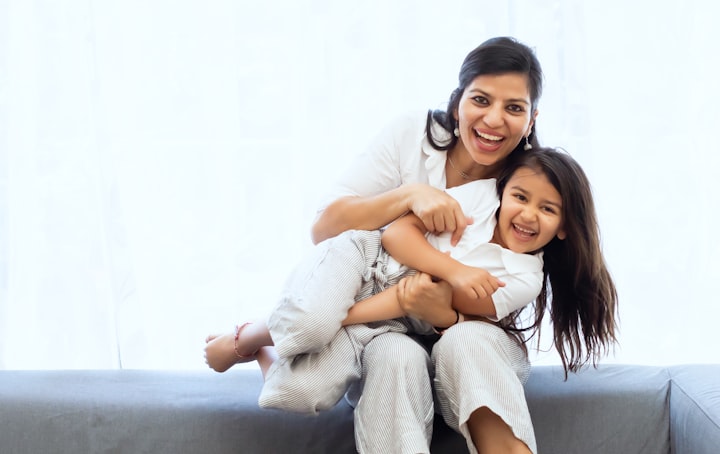No One Prepared Me for My 8-Year-Old Son Calling Me “Bruh”
The best-kept secrets of parenting
That’s sus, bruh. I look around, but he’s talking to me. My 8-year-old son just called me “bruh”. Let’s overlook the fact that I only recently defined “sus” for him. He went from mama to mommy to mom to bruh faster than I ever expected. Mostly, because I never expected that last one.
Parenting isn’t for the weak. Every day, something new is thrown at me. Lately, it’s bruh. But on any given week, I am reminded that my babies just aren’t babies anymore. They’re growing up, and the youngest one keeps adding to his trendy vocabulary to stay cool — because cool, I’m informed, is much better than handsome. I’ll just jot that down next to all the other things I’m learning about my children this year.
The Best Kept Secret of Parenting
That’s the thing about parenting that no one ever really tells us: Every year, we are learning to be parents all over again. We go from figuring out being parents of infants to suddenly being parents of little people who call us bruh and think our every move is sus. Just as they’re figuring things out at every single age and stage, so are we.
Parents are just as clueless as kids in some respects. We don’t actually know everything. In fact, I’m now questioning if every “because I said so” really meant “I have no idea; I’m just winging it here.” There should be a few key differences, however.
Emotion Regulation
For example, if we’re old enough to have kids, we’re old enough to have unpacked some of our trauma and learned to regulate our emotions. We shouldn’t be having an equivalent number of tantrums as our children. We’re responsible for learning coping skills — and then teaching and modeling them for our children to learn.
Parentification
While it shouldn’t have to be said, kids should be the ones being taken care of and parents should be in charge. Too many children are out there having to carry the weight of their parents’ problems, finances, relationships, and mental health when all they should be carrying are their backpacks and lunch boxes. What I don’t know about being a parent could fill oceans, but I know this much is true both as a parent and as a former mental health professional.
It’s called parentification, and it happens when we let the roles get reversed and start expecting our children to take care of us. It’s often a form of trauma, and it can result in children experiencing anxiety, depression, suicidal thoughts, social isolation, perfectionism, chronic illness, and trust issues. It can even increase the risk of eating disorders and substance abuse. Kids are supposed to be kids, and we, as parents, need to let them.
Parenting Cycles
We should also be growing as parents rather than assuming that how we were raised is the gold standard of parenting simply because we survived to adulthood. We need to become cycle breakers who don’t perpetuate abuse, intolerance, or hate just because it was normalized for us. As parents, we’re responsible for helping our children become better human beings by learning from the mistakes of the past. We’re responsible for creating safe, healthy, and loving environments where children can thrive — not just survive.
Perspective
Parenting requires perspective. Our children are infants for a single year. They are toddlers for all of two years. They’re considered preschoolers until the age of 5. They’re school age from 6–8 and then shift into the “tweens” through the age of 12. As much as many of us dread the teenage years, it’s a stage that only last 5 years of their childhood.
This perspective is important. As fast as we’re told children grow, multiply it. It seems to happen even faster — and frankly, we waste it by dreading certain ages and stages. Calling the twos terrible or lamenting the drama of the teenage years can have us dreading those stages rather than cherishing them.
Sometimes, I sit back and marvel that my children have entered the tweens. The clock is ticking on my time as a parent of minors, and one day, I’ll be learning how to be a parent to adult children. It’s a thought that can help put their childhood into perspective.
The Grace of Parenting
Children are often resilient and forgiving. As parents, we screw up. We make a mess of things. But if we’re genuinely trying to do our best, we learn to apologize, be accountable, and make amends. We stop pretending to have all the answers and start admitting that parents are fallible humans, too.
I never expected the day to come when my youngest child would start to regularly call me bruh. I never thought I’d greet that day first with shock and then with delight. I am amused every single time it comes out of his mouth. I don’t view it as a sign of disrespect. Instead, I’m seeing him explore social dynamics and pick up on the evolving language around him. Does he roll his eyes like I’m a total embarrassment when I call him bruh right back? Of course. I do it anyway.
Everyone says parenting is hard, but we might assume that’s because it’s expensive and time-consuming. The real challenge is knowing that we can wholly and unconditionally love our children, but it won’t protect them from the outside world or prevent them from ever experiencing pain. All we can do is teach them how to be good humans who make good choices and hope it’s enough.
All we can do is love them and remember to give them a little grace because they’re learning, too.
Originally published on Medium
About the Creator
Crystal Jackson
Crystal Jackson is a former therapist turned author. Her work has been featured on Medium, Elite Daily, NewsBreak, Your Tango, and The Good Men Project. She is the author of the Heart of Madison series and 3 volumes of poetry.







Comments
There are no comments for this story
Be the first to respond and start the conversation.